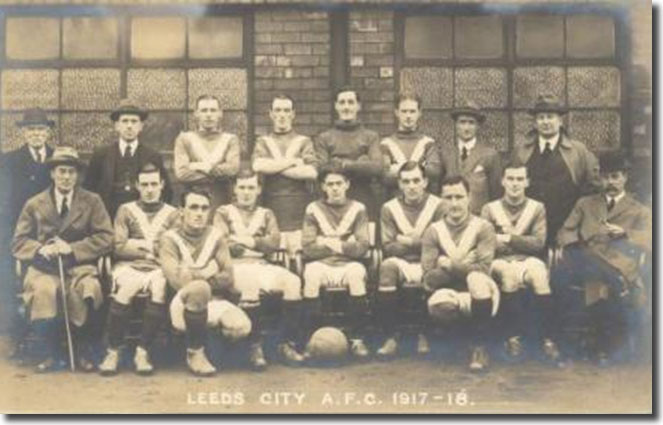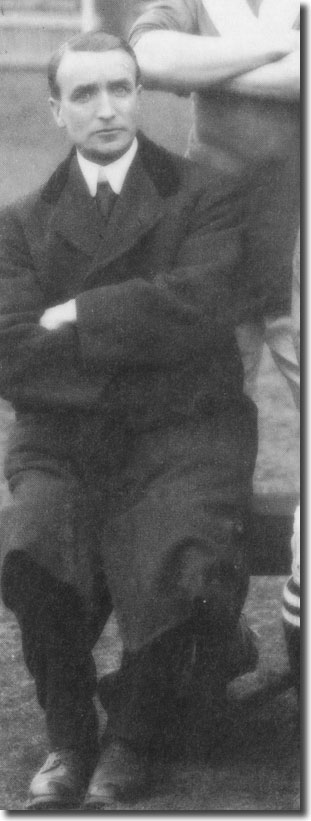 |
 |
 |
Joseph Connor was a businessman from
the city of Leeds with a passionate interest in football and making it
a  success
in West Yorkshire, where it had been slow to get off the ground, though
Bradford City won the FA Cup in 1911.
success
in West Yorkshire, where it had been slow to get off the ground, though
Bradford City won the FA Cup in 1911.
He became a member of the West Riding Football Association, serving on committees and when J Whitehouse retired as president in 1911 after three years in the role, Connor was elected to the job. He also acted as the WRFA's representative on the FA Council from 1914 till 1920.
One of the key challenges faced by Connor over the next few years was keeping things on track following the declaration of war on 4 August 1914.
A month later, the WRFA's Cup and Emergency Committee met at the Grand Central Hotel in the city centre and 'unanimously decided to abandon the Amateur Cup competition and the County Cup competition for the present. It was further decided to recommend that all competitions … sanctioned by the association or by any local association under its jurisdiction, be abandoned for the present'.
Connor, who had a keen interest in local club Leeds City, presented the West Riding Cup to City captain Jimmy Speirs after his side beat Hull City 1-0 at Elland Road on 11 November.
After handing out the winners' medals, Connor took the opportunity to respond to those who criticised the football authorities for deciding to continue despite the conflict in Europe. He said it was not fair that the game should be singled out for special criticism and insisted that football had 'responded creditably to the country's call. In the West Riding Association alone the returns showed that about 2,000 players had enlisted in one or other of the national forces. The Association gave every encouragement to players to enlist and would continue to do so.'
Following the death of Leeds City chairman Norris Hepworth in 1914, accountant Tom Coombs, who had been running the club on behalf of the debenture holders, began considering how best to resolve the club's financial difficulties.
When Coombs announced on 2 August that
he was considering a proposal for the transfer of City from Elland Road
to Headingley Stadium, the ground of Leeds Rugby League (Northern Union) Club, it sparked a protest
from City supporters.
the ground of Leeds Rugby League (Northern Union) Club, it sparked a protest
from City supporters.
All along, Coombs had been clear that he would be happy to talk to anybody who were interested in buying the City club. A few weeks earlier, Connor formed a syndicate of local businessman which also included Johnny Whiteman, one of the existing directors and a theatre agent, Mr W H Platts, a Leeds accountant, Sam Glover and George Sykes. They made an offer to purchase the club and began negotiating with Coombs, but the question of the compulsory purchase of the ground caused a stalemate. The syndicate were prepared to take the ground on a ten years' lease with the option of purchase, but their offer fell short of what Mr Coombs required, and it was rejected.
When Connor's syndicate approached Coombs again with a new proposal, a deal was done and the club transferred on Monday 9 August.
The move was warmly welcomed by City supporters.
The undertaking which the syndicate had entered into was that the management and other current expenses should be taken over immediately. They agreed to pay £1,000 up front with a conditional payment of £250 to follow if they were able to raise it through the sale of players. They were also committed to cover all contractual liabilities, including the lease of Elland Road for five years with an option of a further five years, at a rental of £250 a year. They were given an option to purchase the stadium for £5,000.
Connor, who was loudly cheered, said when he and his colleagues approached Coombs 'they did so for the good of the Association code, and they had no intention of making money out of professional football'. He suggested that football ought to take a back seat at the present time but hoped that when the war was over 'Leeds City would be a successful organisation.'
Connor was appointed chairman by the other members of the consortium with Whiteman as vice chairman and a limited liability company was formed.
Stephen Studd in Herbert Chapman: Football Emperor: 'Connor was seen as a "valuable acquisition" and the "responsible and qualified adviser from a football standpoint which Mr Herbert Chapman has needed". As The Athletic News pointed out, City's future now seemed more assured.'
Chapman took temporary leave of Elland Road in the summer of 1916 to support the war effort at the Barnbow Munitions Factory. His assistant, George Cripps, took on responsibility for firstly administration and then later team selection. It was a disastrous arrangement and Connor and Cripps quickly fell out, with the chairman blaming the manager for the club's financial difficulties. In 1917, only the intervention of the Football League persuaded the board to continue rather than winding the club up.
As per Daniel Chapman in 100 Years of Leeds United: 1919-2019, 'According to Connor, the directors had so much trouble with Cripps they stipulated that only one director should travel with the team, and it should never be Cripps. In February 1918, Cripps turned up at an away match at Nottingham Forest anyway, and after the match Chapman received a letter from the team captain, Jack Hampson, stating that the players would strike unless Cripps was allowed to start going with them again. It took a personal intervention by Chapman to convince the players to accept the directors' conditions and continue playing. Connor viewed the incident as scurrilous insurrection instigated by Cripps, but Cripps simply pointed to another £30m bonus he received at the end of another season's work.'
When football was allowed to resume in earnest after the War, the club was accused of making illegal payments to players and were expelled from the Football League when Connor refused to hand over documents and records.
The chairman was handed a lifetime ban from attending football matches and taking part in football management, along with Whiteman, Glover, Sykes, Cripps and Chapman, though the latter eventually had his punishment rescinded.
Connor's ban also meant that he had to step down from the West Riding FA, though he insisted that the club had not been given the opportunity to state their case.